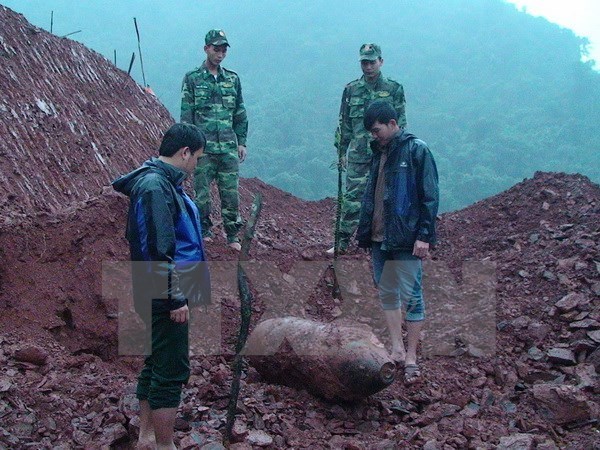
Vietnam is among countries with serious UXO pollution and suffers from the most severe war consequences in the world - Illustrative image (Source: VNA)
Held by the State Steering Committee on the National Action Programme on Settling Consequences of Unexploded Ordnance (UXO), the event saw the participation of representatives from the Ministry of Labour Invalids and Social Affairs (MoLISA), other ministries and relevant sectors as well as thousands of youngsters.
In his speech at the event, Deputy Minister of MoLISA Le Quan stressed towards the goal of resolving the landmine and UXO contamination in a sustainable manner, the Vietnamese Government has paid special attention to devising social support mechanisms and policies for victims of bombs and mines nationwide.
All bomb and mine victims across the country have been provided with health insurance cards and rehabilitation support; and joined vocational training programmes, he added.
Quan highlighted valuable assistance and efforts made by international donors and foreign non-government organisations for Vietnam in the work, saying that Vietnam hopes to continue receiving cooperation and help from the international community in the scheme.
The event included many activities such as a parade with the participation of a large number of local people, youths and students; and an exhibition featuring objects and photos on UXO pollution and danger, as well as Vietnam’s efforts in the work.
Vietnam is among countries with serious UXO pollution and suffers from the most severe war consequences in the world.
It is estimated that around 800,000 tonnes of UXO were left across the country after the war ended, mostly in the central region. More than six million hectares of land in the country is bomb-and mine-polluted, accounting for 18.82 percent of Vietnam’s total area.
At least 100,000 people have been injured and killed by bombs and mines since 1975, while the environment and natural resources have been affected./.
VNA
 Vietnam to pilot online tax declaration portal this month ahead of 2026 rollout
Vietnam to pilot online tax declaration portal this month ahead of 2026 rollout



